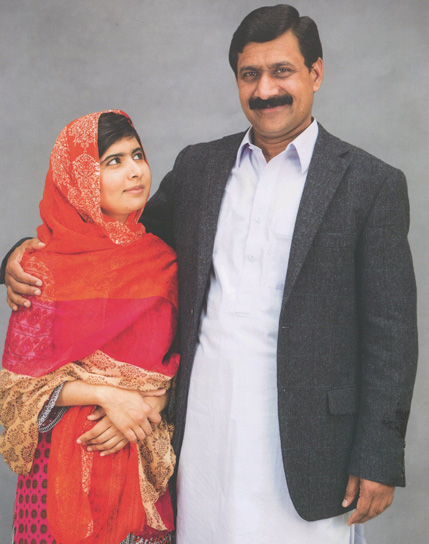In the realm of human advancement, Bahá’í teachings elucidate the interrelationship between spirituality and the quest for societal progress. Nowhere is this intersection more vividly illustrated than through the life and actions of Malala Yousafzai’s father, Ziauddin Yousafzai, a prominent advocate for education and gender equality. His endeavors compel us to explore the intricacies of true progress as envisioned by Bahá’í principles, which advocate for the betterment of humanity through spiritual development and social action.
True progress, as asserted within Bahá’í teachings, transcends mere economic advancement or technological innovation; it is fundamentally rooted in the moral and ethical upliftment of individuals and communities. Ziauddin Yousafzai epitomizes this concept through his unwavering commitment to educational access for girls in Pakistan. The narrative surrounding his activism serves as a poignant case study in how individual efforts, when aligned with higher spiritual principles, can catalyze profound societal transformations.
In examining the Bahá’í understanding of progress, it is essential to recognize the multidimensional nature of this concept. It encompasses spiritual, social, economic, and political dimensions, all of which are interlinked. Bahá’í teachings assert that the advancement of civilization hinges upon the realization of universal education, the promotion of gender equality, and the establishment of justice. Ziauddin’s advocacy often reflects these tenets, illustrating how educational initiatives foster empowerment, particularly among marginalized groups.
One of the foremost dimensions of true progress highlighted in Bahá’í writings is the significance of education. The profound assertion that “Education is essential for the advancement of humanity” reflects a fundamental belief that knowledge is a catalyst for development. Through the establishment of the Khpal Kor Foundation, Ziauddin Yousafzai has championed educational endeavors that prioritize underprivileged girls, thus exemplifying a commitment to equitable access to learning. This aligns harmoniously with Bahá’í teachings which accentuate that an educated populace is paramount for the attainment of a global civilization.
As we explore the ideals of true progress, we must also consider the implications of gender equality as integral to humanitarian advancement. The Bahá’í Faith calls for the comprehensive emancipation of women, advocating that their unequivocal involvement in societal contributions fosters a balanced and just world. Ziauddin’s activism has brought to light the transformative power of educating girls—not only does it empower individual lives, but it also engenders wider societal benefits, including economic development, health improvements, and enhanced community stability. By championing this cause, he has demonstrated a profound understanding of the Bahá’í principle that advancing gender equality is fundamental to realizing true progress.
Moreover, the concept of justice permeates the Bahá’í perspective on progress. A just society is pivotal in dismantling systemic injustices that hinder human flourishing. Ziauddin’s narrative, particularly his resistance against oppressive forces that seek to deny education to girls, resonates with Bahá’í ideals of striving for justice and equity. His audacious stance against extremism, coupled with a relentless pursuit for the right to education, serves as a clarion call for justice that echoes across cultural contexts, emphasizing that true progress necessitates challenging oppressive structures and advocating for human rights.
A noteworthy aspect of Ziauddin Yousafzai’s message centers on the notion of unity in diversity—a core tenet of Bahá’í belief. His approach highlights that collaboration and synthesis among diverse groups, irrespective of gender, culture, or geographic location, is vital for addressing global challenges. The confluence of different perspectives enriches discourse and nurtures innovative solutions, thereby accelerating the trajectory of progress. By fostering dialogue and understanding across cultural divides, Ziauddin’s work exemplifies how unity can emerge from diversity, propelling humanity towards a common goal of collective advancement.
In engaging with the narrative of Malala’s father, readers can expect a profound analysis that traverses the themes of spirituality, education, gender equality, justice, and unity. The exploration extends beyond mere biographical recounting; it delves into philosophical discussions that interrogate the essential nature of progress itself. This multifaceted approach is emblematic of Bahá’í teachings which endorse a holistic understanding of human development.
Additionally, readers will encounter practical insights into how the teachings of the Bahá’í Faith can be applied in advocating for social change. Ziauddin Yousafzai’s life serves not only as an inspirational tale but also as a clarion model for individuals and communities seeking to effectuate meaningful change through the lens of Bahá’í principles. His endeavors underline the importance of resilience, the courage to voice dissent against injustices, and the imperative to cultivate environments conducive to education and equality.
Ultimately, the dialogue surrounding Ziauddin Yousafzai’s contributions invites a reconsideration of progress. It compels a reflection on one’s role in the grand tapestry of humanity, encouraging a commitment to values that align with spiritual ideals. In a world rife with challenges, the teachings of the Bahá’í Faith accentuate that true progress is achievable only when guided by the principles of justice, equity, education, and unity.
Through the lens of Malala’s father, the Bahá’í narrative on true progress becomes not merely an abstract ideal but a tangible movement towards a brighter, more equitable future where humanity flourishes as a collective entity. This sincere pursuit of betterment, anchored in faith and action, embodies the true essence of what it means to progress—spiritually, socially, and morally—together.
